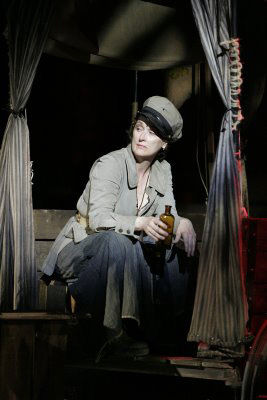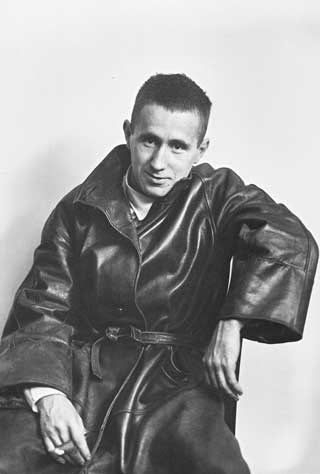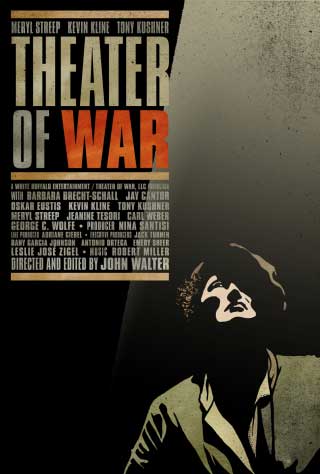While Oscar-winning actress Meryl Streep garners attention for her role
as the authoritarian nun in Doubt, another film the doc
Theater of War out now offers insight into Steep as an actress,
and it grapples with the nature of war as viewed through the life and
work of the late, great German playwright Bertold Brecht.
Summer, 2006, the Public Theater staged an incredible production of
Brecht's painful anti-war tragedy, "Mother Courage and Her Children" in
Central Park. Directed by George Wolfe and starring Streep, the play
received great notices and focused attention through the experience of
live theater on our very own war still raging in Iraq to this day.
Film
director John Walter (who did the quirky art doc How To Draw A Bunny,
a Special Jury Prize winner at the 2002 Sundance Film Festival) forged
this thought-provoking documentary as a short meditation on Brecht and
his views of war, politics and peace; it was also a look at the process
of staging the play and as a take on an actress who can convey emotions
and ideas with an economy and forcefulness to her art.
In
the film, we also get to see the creative dynamic between Public Theater
artistic director Oskar Eustis, former artistic director Wolfe, and
Brecht translator/adapter, the award-winning playwright Tony Kushner, as
they bring the production to fruition and discuss the underlying
philosophy and politics of Brecht's definitive anti-war screed.
This
film is a unique hybrid: a documentary about theater and more.
Yes,
it is kind of a hybrid... It's because we had so little time to do it.
It was a little counterintuitive to the [normal way] a documentary is
put together. I only heard of [the production] two weeks before the
rehearsals were beginning. So I got to meet with Meryl and pitch her the
idea of letting us film while she was doing it. That was kind of
freeing; I couldn't try to talk her into it I just had to tell her
about it and she had to decide whether to do it or not. I just described
my intentions.... And then she had to say yes or no.
Then
I had a couple of weeks to raise money so we didn't have to write a
detailed treatment. I just said, "Here's what I have: I have this movie,
it has Meryl Streep, and we've got about two weeks to get it together or
there is no movie [laughs]." In a lot of ways I was thinking
about [French experimental film director] Chris Marker. Brecht had this
mania for documentation himself. For every production, he created these
model books which are used in film.
 You
had so much rich material to work with from his documents and past
performances...
You
had so much rich material to work with from his documents and past
performances...
It
was at Brecht's insistence that he created a visual score for every
piece. Every gesture and position of the actors was documented. So I
started thinking about Marker's film La Jettee and the way he
told this complicated science fiction story using only still
photographs. They had this great, grainy black and white, almost
surrealist quality to them. I thought... "Wonder if I could do same
thing with Brecht's model books. So I set [the pages] into motion using
the camera. I thought, "That's one idea."
Then
there was the thought of doing a straight cinema verite style of
observational documentary of the rehearsal process. Then it was the idea
of taking the two films and setting them into a dialogue with each other
like Marker does in Sans Soliel where he has these several
stories and these themes, and he puts [it all] out on the table for
audience sometimes he makes a connection and sometimes he doesn't.
That's what I was thinking at the beginning of the project.
Did
it make sense simply by shooting the play...
We
shot the entire play several times, but only in rehearsal. The intention
of the project was only to shoot rehearsals. That's what I told Meryl;
we'd start from the first table read until the last minute. We never see
the end result that's theater. The only time [you see] the cast in
costume is a dress rehearsal. In fact, the film starts with George Wolfe
saying that this is not performance; it's a rehearsal. As an audience
member, you watch a rehearsal differently than when you watch a
performance.
Also, when you're watching a performance you view it as a consumer and
as a critic; you're judging it rather than being in dialogue with it. I
wanted the audience to learn the play along with the actors.
We
also see the culture that Brecht was a part of and who Brecht was. It
offers a fascinating opportunity to learn more.
That's a big part of it. The whole project originated with my own
fascination with the character and work of Brecht how I learn more
about it myself, and then how would I explain it to someone else. I
wanted to go on a trip to Brechtland and to bring back home movies about
it that [are] not boring.
And
its relevance today...?
I
wasn't trying to show that it was relevant today, but rather to ask the
question of the audience: if you as a viewer think it's relevant, then
that's your own answer. I wanted to raise that question and explore and
dig up enough material to answer it.
You're sharing the process that Meryl Streep and the rest of the cast
discovered...
Everyone has a job to do, to think about this stuff and explore these
questions and entertain people.
 What
did you learn about Bertold Brecht?
What
did you learn about Bertold Brecht?
One
thing about documentaries is that you can appropriate them for your own
studies, just like I did with Brecht's documents which he created for
stage directors to use to understand his direction. Someone will find
this film historically significant.
What
I really learned about Brecht was that in his mania to be modern, he
could absorb the oldest influences, from the Bible to medieval painting
to chronicles of 15th century battles. One of the great pleasures for me
was to be in Brecht's library. It was his apartment building where he
had lived in the last few years of his life. He died there. It has been
preserved as a museum, the Brecht Archive and Museum in Berlin.
There's his apartment, and the archive with his manuscripts and complete
works on the other floor. On the bookshelf I took out his pocket Bible
from the 1920s. I opened up his bible: inside the front cover he had
glued a picture of Buddha; in the back he had glued a picture of a fast
car.
Why
is he relevant? What fascinates you about him?
It
must be his sheer perversity the way he approaches structuring a
story... the fragmented structure and the way he approaches a character,
building a character through an accumulation of contradictions, as
opposed to some elaborated type where you articulate for the audience
their story arc. His wide-ranging imagination mixed the highest
seriousness with the lowest of humor. He was a ringmaster, a showman,
manic nutcase, part philosopher part song-and-dance man.
 How
did it get started?
How
did it get started?
It
was Oskar's idea to do it in the park. Tony wanted to do a translation
and both had the idea of having Meryl tackle the role. My intuition
going into the project was that if [George W.] Bush hadn't talked the
country into invading Iraq they wouldn't been doing "Mother Courage" but
"Galileo" or "Three Penny Opera." It was cause and effect.
When
you hear Meryl talk about the working class you do think about the Bush
government...
One
funny, dopey criticism about Tony's translation was that he worked in
lines about the Bush administration into Brecht's text. He did not add
anything; it was there in older translations. It was Brecht talking
about Hitler and talking about war. Tony rendered the text into American
English. Brecht was using dialect and old peasanty syntax. When you
render that into a language for an actor you find the equivalent.
Previous translators were British. You can't give it to American actors;
it doesn't work with a cockney feel. That's what Tony wanted to do with
the translation.
So
what was Meryl like? You got an insight to her by seeing her in process.
One
uncanny aspect of making this film [was] feeling like I was watching a
movie [and] forget I was documenting a rehearsal. You find yourself
crossing the line and watching a fiction unfolding. I'm looking at Meryl
Streep and then it's "Mother Courage;" watching her respond to emotional
situation, I choke up when she sings the lullaby to the dead kid.
That's the thing about Meryl Streep; she breathes life into a character.
She is "Mother Courage," not Meryl Streep.
That's her archetype the chameleon. I did not have that
much time with her only about two hours with her just talking. But she
was not the type of person I would get... shy with. I didn't feel that
around Meryl; she just seemed like another person doing her job. I don't
know, but she doesn't have that celebrity [attitude].
Email
us Let us know what you
think.
Features Return to the features page